Imagine a world where your favorite sports app not only gives live updates but also predicts outcomes, offers personalized training routines, and chats with you like your personal coach.
Welcome to the world of AI in sports apps!
Artificial intelligence in sports apps is changing how players train, fans connect, and teachers plan, making everything faster, better, and more natural.
From AI-powered sports analytics that dive deep into performance metrics to AI in fantasy sports apps that improve your game strategy, smart algorithms are changing the playing field.
It's not just about a better user experience; it's a change in how we understand and connect with sports in the digital age.
With AI in sports betting apps, users get future insights driven by huge datasets.
With AI for personalized training apps, workouts change in real time based on progress and performance.
Ready to explore how AI in sports apps is changing the future of the game? Let's dive in.
Market Growth of AI in Sports Apps
The sports app industry is experiencing rapid growth, driven by improvements in artificial intelligence in sports apps and the growing demand for real-time, personalized sports experiences.
AI-powered sports app solutions are improving user experience by providing better analytics, predictive match outcomes, injury forecasts, and hyper-personalized training programs, all in real time.
Here are some key figures that highlight the growing momentum of this sector:
-
- The global AI in the sports industry market was valued at around USD 1.6 billion in 2022 and is projected to surpass USD 7 billion by 2030, growing at a CAGR of over 30%.
- The market for AI in sports analytics apps alone is expected to reach USD 4.5 billion by 2028, driven by demand for data-driven decision-making.
- North America leads the charge, but the Asia-Pacific region is catching up fast, thanks to growing tech adoption and a booming sports fan base.
These trends point to a new era where AI in sports apps isn't just an addition; it is the engine generating innovation, engagement, and performance.
Next, let’s study what exactly AI in a sports app means and how it’s transforming user contact and athletic outcomes.
What is AI in a Sports App?
AI in sports apps is transforming how people experience sports, whether they're fans, athletes, or coaches.
From personalized training to predictive analytics, AI brings a new layer of intelligence and engagement to these platforms.
By integrating artificial intelligence in sports apps, developers can study huge amounts of real-time data to give better insights, quick feedback, and accurate predictions, far beyond what traditional systems could offer.
With machine learning in sports apps, AI can spot performance patterns, measure injury risks, and even suggest strategy plays, fitting every recommendation to an individual's goals or interests.
The result? A better, more interesting, and highly personalized experience.
Key features of an intelligent sports app system include real-time game analysis, AI for personalized training apps, player performance tracking, and AI in fan engagement apps that directly connect users with their favorite teams.
It's the basis of what we now call AI-powered sports app solutions: smart, quick, and deeply data-driven.
How is AI Transforming Sports Apps?
You might be wondering: How is AI being used in sports analytics today?
The answer lies in one word: data. Every player's movement, every match highlight, every fan contact, and even every heartbeat from a tracking device produces important data.
AI in sports apps takes all this info and turns it into smart, useful insights. Let's break down how artificial intelligence in sports apps is transforming the game:
1. AI-Powered Performance Predictions
Gone are the days when performance predictions were based solely on expert views.
Today, AI in sports analytics apps studies huge datasets, including match video, biological signs, tiredness levels, and previous stats, to predict how a player might perform in an upcoming game.
This allows coaches to plan better strategies, helps fantasy sports users pick winning teams, and gives fans next-level views into the games they love.
2. Personalized Workout and Training
With AI for personalized training apps, athletes and fitness enthusiasts get custom workout plans based on their performance, goals, and even pain history.
Using machine learning in sports apps, the system changes and grows, constantly improving processes to give better outcomes.
This is a game-changer for both professional athletes and regular users looking for that extra edge in their fitness journey.
3. Enhanced Fan Engagement
How can AI be used in sports to make fans more involved? Through hyper-personalized information.
AI in fan engagement apps analyzes a user’s behavior and tastes to deliver relevant updates, product suggestions, exclusive videos, and even AR/VR experiences in real time.
This creates stronger emotional ties and boosts app retention significantly.
4. Immersive Virtual Experiences
AI-powered sports app solutions now integrate smart sports app technology with virtual and augmented reality.
With the help of AR VR development services, fans can experience immersive 360° virtual stadium tours or have AI analysts break down plays in real time during replays.
By adding AI features for sports apps, developers can turn a regular platform into an intelligent sports app system that is interactive, predictive, and highly engaged.
In short, AI in sports apps is transforming how we learn, fight, and cheer. It's no longer just about watching the game; it's about feeling it like never before.
Key Applications of AI in Sports Platforms
Have you ever thought about how your sports app always seems to know what you want?
There's no chance of that. It's AI at work. AI in sports apps is changing the game in the digital age, changing how fans cheer, athletes train, and coaches strategize.
The integration of artificial intelligence in sports apps is changing user experiences and making sports apps more dynamic and intelligent.
Examples include real-time predictions and custom workouts.
In mobile app development, using AI-powered sports app solutions guarantees more features, more user involvement, and the most personalised experience possible.
In sports apps, AI is making a big difference in the following game-changing ways:
► AI for Personalized Training Apps
Leading the way in using AI for personalized training apps are apps like Freeletics, Nike Training Club, and Fitbod.
To make personalized fitness plans, these platforms look at things like a user's workout experience, performance levels, and fitness goals.
Thanks to machine learning in sports apps, these plans change in real time, providing a smart sports app technology experience that grows with each user.
► AI in Fan Engagement Apps
Engaging sports fans goes beyond scores.
Today's AI in fan engagement apps uses natural language processing (NLP) to chat with users, share information, offer match recaps, and suggest personalized content.
This creates a two-way exchange that improves recall and builds a better emotional link with fans.
In app development, adding these AI features for sports apps leads to more engaging and satisfying user experiences.
► AI for Sports Analytics Apps
Still asking, how is AI used in sports? The answer lies in deep, data-driven analysis.
Teams and coaches depend on AI for sports analytics apps to examine player performance, track rival strategies, assess injury risk, and even improve game-day choices.
The importance of AI in sports apps here is clear. It helps professionals gain a competitive edge using prediction models and practical insights.
► AI in Sports Betting Apps
Curious about how to use AI in sports betting? It's all about smart predictions.
AI in sports betting apps uses past and live game data to predict match outcomes, odds, and player behavior.
This helps users to make more informed betting decisions with trust.
As a result, betting platforms become more trustworthy and entertaining through clever sports app systems.
► AI for Fantasy Sports Apps
Platforms like DraftKings, Dream11, ESPN Fantasy, and FanDuel have accepted AI for fantasy sports apps to improve the player experience.
AI recommends the best players based on form, opponent strength, and past stats.
It also tracks injuries, weather factors, and game changes to provide real-time team management ideas.
This not only improves gameplay but also shows the benefits of AI in sports apps, such as improved accuracy, engagement, and personalization.
By putting these innovations into app development, businesses can build AI-powered sports app solutions that cater to changing user standards.
Whether it's improving athletic performance, enhancing fan engagement, or providing better predictions, the role of AI in sports apps continues to grow rapidly. It is transforming the entire AI in sports industry.
Partnering with the best mobile app development company ensures these advanced features are implemented effectively, helping brands stay ahead in a competitive digital landscape.
Role of AI in Sports Apps
Ever thought why your favorite sports app feels smarter, faster, and more in tune with your preferences lately?
That's AI in sports apps working quietly behind the scenes, turning regular platforms into intelligent sports app systems that think, learn, and grow with you.
Whether you're watching your favorite team's performance, betting on a match, or following a custom workout plan, artificial intelligence in sports apps is changing every touchpoint into a tailored experience.
Let’s break down the role of AI in sports apps into five important areas:
1] Hyper-Personalization
Personalization is at the heart of AI-powered sports app solutions.
Just like how Netflix recommends shows, AI in sports apps offers highlights, match updates, player numbers, and even workouts based on your behavior.
Whether you're a fitness enthusiast, a die-hard fan, or a fantasy league competitor, AI uses past contacts, tastes, and behavior patterns to create hyper-personalized sports experiences.
This means no more general alerts. Everything is designed just for you.
This level of customization is a key benefit of AI in sports apps, keeping users interested and coming back for more.
2] Predictive Analytics
Still asking, "How is AI being used in sports analytics today?" It all starts with predictive analytics.
By crunching vast volumes of historical data, scores, injuries, training stats, and even weather, AI in sports analytics apps can predict:
-
- Match outcomes
- Player performance
- Fantasy scores
- Injury risks
These forecasts power not only the fan experience but also AI in sports betting apps, giving users more accurate odds and insights.
The result? A more strategic and data-rich experience across the board.
3] Automation
What makes an automated sports app so efficient?
AI handles everything from push notifications and content updates to auto-generating news recaps and highlight reels.
AI features for sports apps help platforms run better, faster, and smarter with less human work.
For fans, it means real-time updates that are always accurate. For developers, it means apps that can run 24/7 with minimal human input.
4] Boosting User Retention
Smart sports app technology isn't just about info.
It's about loyalty. By giving real-time data, personalized content, and intelligent suggestions, AI in fan engagement apps keeps users coming back.
Think of chatbots that answer sports questions, suggest matches to watch, or provide motivational workout advice.
These tools create a sticky experience, which is why the importance of AI in sports apps continues to grow among developers and marketers alike.
5] Scalability
As your user base grows, so do the demands on your app. But here's the good news: AI-powered sports app solutions are built to grow.
Whether it's handling more data, serving foreign users, or integrating with new technologies, AI ensures your app grows quickly. In app development, this flexibility is important to long-term success.
From personalizing to prediction, automation to retention, the role of AI in sports apps is changing how we connect with sports forever.
To meet these growing needs, it's wise to hire dedicated developers who can scale and optimize your app with the latest AI technologies.
And as technology improves, the future of AI in sports apps looks even better.
Ready to tap into this intelligent revolution?
How Can Businesses Utilize AI for Sports App Success?
Integrating AI in sports apps is changing the game, literally and strategically.
From fan engagement to monetization, artificial intelligence is helping businesses turn their sports apps into intelligent sports app systems that are not just useful, but amazing.
Whether you're running a fantasy league platform, a training-focused app, or a fan experience hub, AI-powered sports app solutions can fuel business success through better choices, greater personalization, and scalable innovation.
Here's how your sports app business can use AI to win big:
A] Monetization through Premium AI Features
Offer AI-powered insights as extra services to improve your standard or fantasy sports app monetization. Think individual workout plans, fantasy team optimization, or real-time match predictions.
These AI features for sports apps not only boost user happiness but also open up new revenue streams.
Users are ready to pay for value, especially when it feels like having a personal guide or planner in their pocket.
B] Enhanced Engagement Metrics
AI in fan engagement apps takes user contact to the next level.
Chatbots powered by Natural Language Processing (NLP) can answer questions, provide information, or offer content based on user behavior.
This constant, personalized contact helps improve session times and engagement rates, making casual users into loyal fans.
C] Operational Efficiency with Automation
Say goodbye to manual effort and hello to the automated sports app era. AI can automate routine support queries, push notifications, and content delivery.
With smart sports app technology, businesses save time and reduce overhead, freeing up resources for innovation and growth.
D] Actionable Business Insights
Want to know what your fans love?
Let AI tell you. By analyzing user preferences, in-app behavior, and comments, AI for sports analytics apps provides deep insights.
These findings help improve features, personalize marketing, and create better user experiences.
As the importance of AI in sports apps continues to grow, businesses that adopt these technologies will stay ahead of the game.
From predictive analytics to hyper-personalized training plans, artificial intelligence in sports apps is not just about better functionality. It's driving business growth.
The benefits of AI in the sports business are clear: smarter decisions, higher revenue, happier users. And that's how you score in today's digital sports arena.
Popular AI-Powered Sports Apps in the Market
Artificial Intelligence is rapidly transforming the sports tech scene, offering better, faster, and more personalized experiences to athletes, fans, and teams alike.
Several leading AI in sports apps are already setting standards, mixing cutting-edge data science with user-centric features to improve performance, engagement, and strategy.
Let's review some of the top AI-powered sports apps making changes in the industry:
1. ESPN Fantasy Sports: Smarter Team Management with AI
ESPN Fantasy Sports uses AI to provide player recommendations, deal ratings, and injury impact predictions.
Its machine learning algorithms analyze real-time performance data and previous trends to help users make better draft and lineup choices.
The app's simple design, combined with intelligent insights, creates a strong fantasy sports experience.
2. Yahoo Fantasy Sports: AI-Powered Draft & Player Picks
Yahoo Fantasy Sports is a fan-favorite that uses AI to improve choosing strategies, suggest trade picks, and guess match results.
Its "Draft Assistant" uses past and real-time data to help users build strong teams, while weekly forecasts are backed by predictive analytics for best performance.
Among the key features in fantasy sports apps, Yahoo offers AI-powered player recommendations, trade analysis, and matchup predictions that give users a competitive edge and a more personalized gaming experience.
3. FanDuel: Personalized Sports Gaming with Predictive Intelligence
FanDuel uses AI in sports betting and fantasy games to offer real-time recommendations and odds predictions.
The platform leverages machine learning to change betting lines, offer top-performing players, and deliver hyper-personalized events based on user behavior.
Its AI models help users improve picks across multiple sports.
4. DraftKings: Predictive Analytics for Smarter Bets
DraftKings stands out for its powerful AI in fantasy sports and betting apps.
It uses AI-driven insights to project player information, suggest ideal teams, and create smart betting scenarios.
With real-time data merging, the platform continually improves its predictive accuracy, giving an edge to users in games and betting.
If you're looking to develop an app like DraftKings, adding these AI-powered features is crucial to offer personalized, data-driven experiences that keep users involved and competitive in the fantasy sports market.
5. CBS Sports Fantasy: AI Tools for Lineup and Trade Strategy
CBS Sports Fantasy combines artificial intelligence to help users improve teams, analyze trade prices, and handle injury risks.
The app offers thorough, AI-generated results based on performance data, game analytics, and predictive models.
This allows users to make better choices throughout the season.
These AI-powered sports apps showcase how artificial intelligence is transforming traditional sports experiences, offering personalized, engaging features that interest users nationally.
How to Develop an AI-Powered Sports App?
Artificial Intelligence is revolutionizing the sports app ecosystem, allowing better analytics, real-time predictions, and hyper-personalized user experiences.
From performance tracking to fan engagement, AI in sports apps is changing how users connect with sports.
If you’re planning to build an AI-powered sports app, here’s a full roadmap to help you create a powerful, data-driven, and engaging application.
► Start with a Clear Vision and Define Your Niche
Before writing a single line of code, describe what kind of AI-powered sports app you want to build.
-
- Is your goal to develop a fantasy sports app with AI-powered lineup suggestions?
- Are you addressing athletes and teachers with AI-driven training analytics?
- Or is it a fan engagement platform giving predictive match results and personalized content?
Clarifying your vision helps place your app in a crowded market and attract the right user group. A narrow niche makes it easier to build features that mean most to your users.
► Choose the Right AI Technologies
AI is the heart of your app. Choose the suitable technologies that match your goals to ensure speed, accuracy, and user happiness.
-
- Machine Learning Algorithms: Improve game predictions, player performance prediction, and accident risk analysis.
- Natural Language Processing (NLP): Power in-app AI chatbots that can answer sports questions, explain numbers, or provide live updates.
- Computer Vision: For motion tracking, video analysis, or real-time player detection in training apps.
- Predictive Analytics: Analyze past game data to create ideas for fans, fantasy sports players, or teaching strategies.
Select a powerful mobile app tech stack, such as TensorFlow, Python, React Native, and AWS, to support real-time processing and data-driven insights.
► Focus on Design & User Experience
User experience can make or break your app, especially in a highly competitive market like sports tech.
Start with mobile app wireframing to map out key user paths, team choices, match predictions, live stats, etc.
Use a simple plan with gamified features for fantasy users or athletes (e.g., progress tracking, scoreboard).
Invest in app prototypes to test UI elements like dashboards, prediction modules, and chatbots early on.
Support multi-platform support so users can share performance or predictions easily on social media or other apps.
A sleek and fast interface improves retention and keeps your users coming back for more real-time sports information.
► Gather and Integrate Data Sources
AI needs fuel, and that fuel is data. Your app should pull from multiple info sources, including:
-
- Player records and past performance
- Team lines and tactics
- Fan engagement data (likes, shares, watch time)
- Biometric and wearable gadget info (for training apps)
Integrate APIs from trusted sports sources or IoT gadgets like WHOOP and Fitbit to make your app more powerful.
► Develop the AI-Powered Sports Intelligence Engine
The basis of a winning AI-powered sports app lies in a well-structured AI engine that provides real-time insights, accurate predictions, and smooth user experiences.
Integrate AI models to analyze live match data, player performance, and past numbers for better predictions.
Use AI app development services to build intelligent chatbots for real-time sports updates and fan engagement.
Implement AI-based suggestion systems for fantasy leagues, betting, or personalized training plans.
Generate AI-powered reports giving in-depth analytics and performance reviews for teams, athletes, and fans.
A strong AI engine ensures your app provides data-driven experiences that fascinate users and drive engagement.
► Test Your AI Sports App Thoroughly
Before launch, your AI sports app must undergo thorough mobile app testing to ensure performance, accuracy, and usefulness across all platforms.
Validate predictive models with real-time sports results and past accuracy. Test the speed and response of AI-based features like live stats and insights.
Ensure smooth functionality of chatbots, dashboards, and analytics tools across platforms. Conduct load tests for big events to handle traffic spikes.
Thorough testing reduces bugs, boosts performance, and ensures a smooth user experience in high-pressure live sports settings.
► Launch & Market Your Sports App
Once your AI-powered sports app is ready, it's time to go live and market it to your core audience, fans, athletes, teachers, or bettors.
Highlight how your app uses artificial intelligence in sports to improve predictions, training, or fantasy play.
Use SEO-driven content marketing with terms like AI in sports analytics, sports betting predictions, and AI for fantasy games.
Leverage sports leaders, niche groups, and app store optimization to increase impact.
To ensure smooth app store submissions, follow the guidelines for submitting an iOS app to the App Store and Google Play Store for broader accessibility.
A smart launch and marketing strategy ensures visibility and user acquisition in a competitive market.
► Continuous Updates & AI Enhancements
AI is always changing, and your sports app should, too. Continuously retrain models with new player data, match results, and user behavior.
Add advanced features like AI-based injury prediction, voice helpers for match updates, or AR sports displays.
Collect user input to enhance algorithms and improve personalization. Partner with app maintenance services to fix bugs, boost security, and ensure smooth updates.
Consistent creativity and maintenance keep your AI-powered sports app ahead of the curve and your users coming back.
Future Trends of AI in the Sports Industry
The future of AI in the sports industry is set to change how fans, athletes, and businesses connect with sports apps.
With fast advancements, AI is no longer just a backroom tool. It is becoming a core part of the internet sports experience.
From real-time analytics to personalized fan engagement, AI is creating better, faster, and more involved sports apps.
One notable trend in fantasy sports app development is the integration of AI to offer predictive insights, simplify team management, and improve user experience through personalization.
► Major Trends in AI-Powered Sports Apps
-
- AI-Powered Virtual Coaches: These smart assistants will help athletes improve performance through real-time training comments and personalized plans, using data from past results and wearable tech to guide users like a real coach would.
- Augmented Reality (AR) + AI: Fans can enjoy realistic, interactive match experiences by viewing real-time stats, highlights, and fantasy game predictions using AR graphics.
- Emotion Recognition: AI will identify users' feelings through facial expressions or voice tones, allowing apps to personalize content such as highlights, notifications, and ideas based on emotional state.
- Wearable Integration: Smarter wearables will easily sync with AI in sports apps to provide specific views on player healing, training load, performance data, and even mental well-being.
- Voice Assistants: A growing trend in fantasy sports app development, voice technology will let users manage fantasy teams, receive real-time updates, and get predictions using simple voice requests.
Clearly, AI is not just a trend. It's the future of sports.
As innovation continues, expect AI in sports apps to drive deeper engagement, better choices, and memorable user experiences across fantasy leagues, training, and live events.
Challenges of Implementing AI in Sports Apps
AI is transforming the sports industry, especially in fantasy sports apps, but it comes with its own set of challenges.
One big worry is data safety. AI relies on large amounts of personal data, and ensuring its safe handling is vital for user trust and legal compliance.
Technical difficulty is another hurdle. Developing a smart, AI-powered sports app needs experience in machine learning, analytics, and predictive modeling, skills that not all teams have in-house.
The cost of AI app development can also be high, especially during the beginning stages involving data collecting, model training, and integration.
Additionally, bias in algorithms can affect fairness and accuracy. Poorly trained AI may produce misleading insights, impacting features like fantasy scores or match predictions.
These challenges in fantasy sports app development must be handled carefully. With the right planning and partners, businesses can beat them and unlock AI's full potential in sports.
Get an AI-Powered Sports App with JPLoft
At JPLoft, we turn innovative ideas into powerful AI-driven sports apps that boost engagement and performance.
As the best Fantasy Sports App Development Company, we integrate features like real-time predictions, player analytics, fantasy league automation, and AI-powered fan interaction.
Our expert team builds scalable, secure, and intelligent apps that evolve with your business needs.
From predictive analytics to voice commands and wearable device sync, we deliver smart solutions tailored for athletes, fans, and fantasy sports users.
Partner with JPLoft to create future-ready sports apps that enhance user experience and drive success in a competitive market.
Wrapping Up
From fan engagement to predictive analytics, the role of AI in sports apps is becoming more important than ever.
The AI change in sports apps is beginning, and early users stand to gain a major edge.
With growing user demands and fierce market competition, integrating AI is no longer acceptable. It's important.
AI allows sports apps to offer personalized experiences, real-time data, and improved performance for athletes and fans alike.
Features like predictive analytics, smart notifications, and voice interaction are changing how users connect with sports content.
Embracing AI technology is key to making any sports app idea into a cutting-edge, future-ready platform that drives success.
FAQs
AI is used for tracking athlete performance, analyzing game footage, offering personalized training plans, predicting match outcomes, and enhancing fan engagement through personalized content, notifications, and immersive app features.
AI improves user experience through personalization, automates routine processes, provides predictive analytics, boosts retention by delivering relevant content, and enhances operational efficiency with real-time data analysis and smart decision-making tools.
AI analyzes massive historical datasets and real-time performance updates to generate accurate betting odds, suggest optimal bets, detect patterns, and reduce human bias in fantasy and sportsbook platforms.
The future includes AI-driven virtual coaches, AR-enhanced fan experiences, emotion-aware content delivery, and advanced wearables integration, making sports apps more interactive, personalized, and aligned with evolving user expectations.
Yes, initial development costs can be significant due to data processing and AI model training. Still, long-term benefits like automation, scalability, and enhanced engagement ensure a strong return on investment.





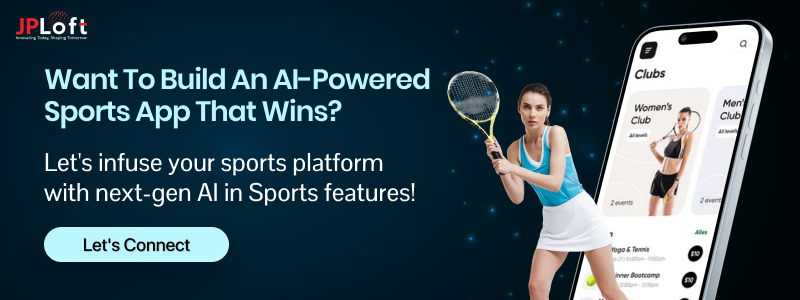
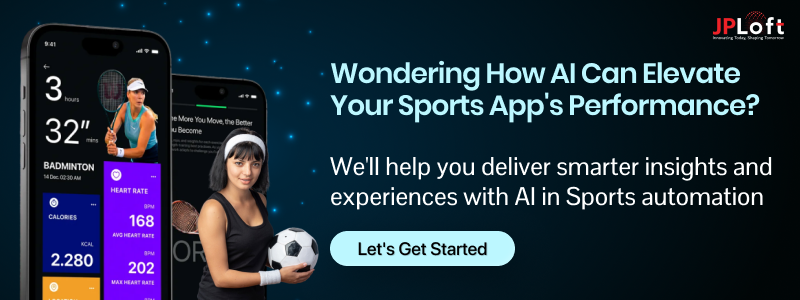
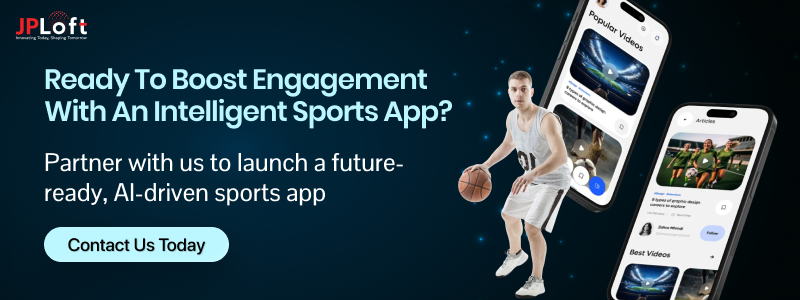


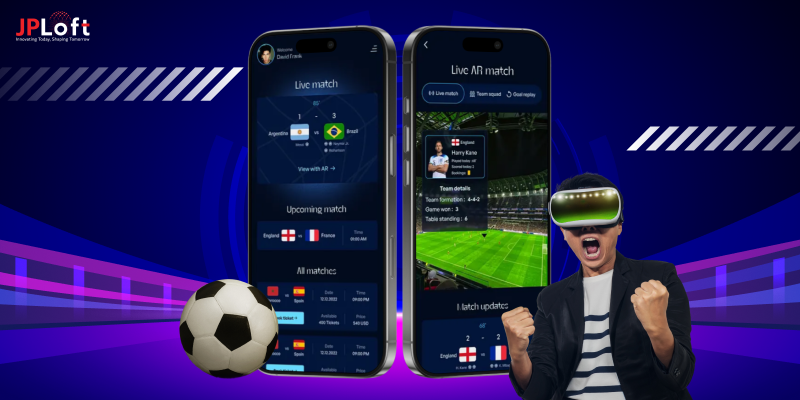
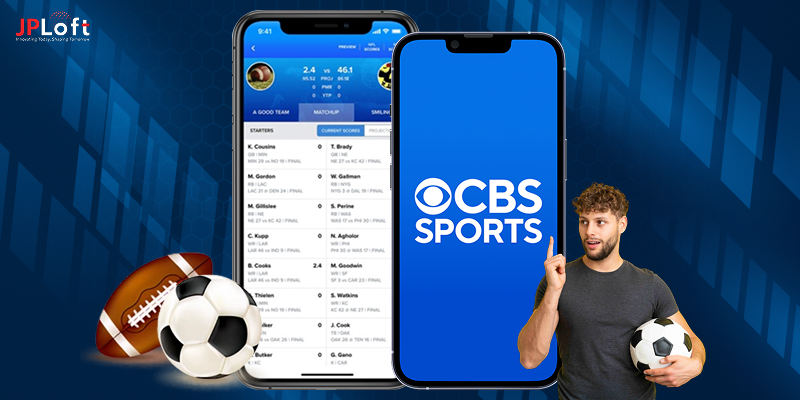


Share this blog